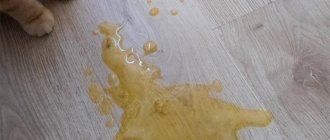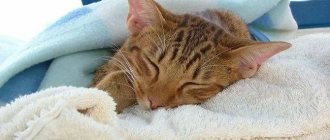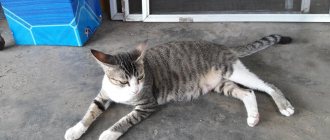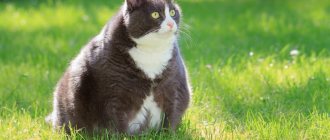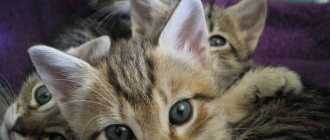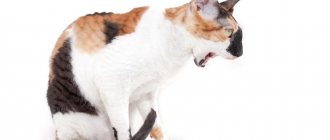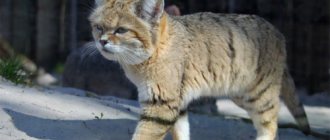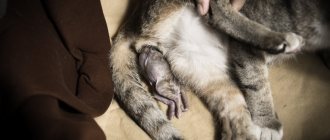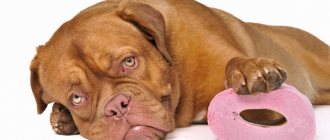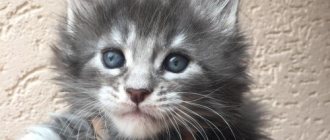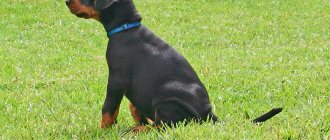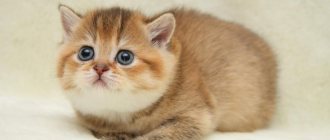Causes of starvation in a cat
There are plenty of reasons why a cat doesn’t eat or drink anything. Diseases can be of infectious or non-infectious etiology. The causative agent of a number of diseases can be:
- viruses;
- fungi;
- bacteria.
Helminthiasis
Regardless of whether your cat is outside the apartment or not, preventive administration of anthelmintic drugs is mandatory for all animals every 3-4 months.
Helminth eggs can enter the house on the soles of shoes, household items (from a store or market), and even on your hands (after all, we all handle handrails in public transport and numerous door handles).
Important! Do not underestimate the danger of helminthiasis, because there are quite a few varieties of cat parasites, many of which can be dangerous for their owners.
Gastritis
Inflammation of the stomach in cats is quite difficult to diagnose, since it often does not manifest itself in the early stages. The causes of such problems in veterinary medicine have not yet been fully studied. In analyzes of sick animals, the bacterium Helicobacter pylori was cultured, but the relationship between its presence and the onset of the inflammatory process has not been scientifically established. It is also unknown whether an animal can get the bacterium from a person.
Veterinarians consider the following provoking factors to be: poor nutrition (in particular, the use of cheap, low-quality feed), taking aggressive medications, helminthiases, and stress.
Among the main symptoms of gastritis:
- loss of appetite;
- digestive system disorder (diarrhea, vomiting);
- lethargy;
- anxiety.
In most cases, gastritis responds well to treatment with special medications. But you can’t self-medicate. It is important to correctly establish the diagnosis, which is only possible after a complete examination of the animal. Without medical help, acute gastritis can become chronic, which can further lead to stomach ulcers, which can even be fatal.
Enteritis
Enteritis is a serious infectious disease that occurs rapidly and is characterized by a strong inflammatory process in the small intestine.
Depending on the cause that caused the inflammation, the following types of enteritis are distinguished:
- viral;
- bacterial;
- post-traumatic;
- helminthic.
Popularly, viral enteritis (panleukopenia) is often called “distemper”.
The intensity of manifestations for different types of disease differs. As a rule, this is refusal to eat, vomiting, severe diarrhea (with particles of undigested food), and general loss of strength.
Important! Enteritis occurs quite quickly and the animal’s condition worsens hourly, so it is very important to contact the clinic as quickly as possible.
Toothache
During the period of changing teeth, a young animal may temporarily refuse to eat if the baby tooth, firmly held in the gum, becomes loose but does not fall out. Eating food causes pain in the cat, which causes it to refuse food. However, it cannot be said that there is no appetite. Simply by putting solid food in its mouth, the cat spits it out. It was as if she wanted to eat, but suddenly changed her mind.
In older animals, similar symptoms may occur due to caries. Toothache affects animals just as much as it does humans. In this case, swelling on the muzzle (flux) may be observed. The cat will violently protest when trying to look into the mouth, even if it has not previously resisted such manipulations.
Inflammatory processes and injuries in the oral cavity
It is difficult for an animal to eat when there are inflammatory processes or injuries in the oral cavity:
- sores;
- swollen gums;
- periodontitis;
- stomatitis.
Any of these problems can cause the animal pain when eating, which can lead to a complete refusal to eat.
Be sure to examine your pet for symptoms of stomatitis!
Foreign body in the throat
Often the reason that a cat cannot eat or drink is because a foreign body is stuck in the throat. It could be a fish bone or something like that. It is important to monitor what your pet eats. Don't let him grab from the floor or ground. Don’t even try to get anything out on your own, otherwise you may damage the mucous membrane of the pharynx or push the stuck object even deeper, which will aggravate the situation.
Important! Foreign bodies can get stuck not only in the throat, but also in the stomach or intestines. As a result, obstruction of the digestive tract occurs. The food rots in the intestines, causing severe intoxication of the body, which can lead to death.
But sometimes a foreign body is solid, and when moving through the intestines it can lead to its perforation (it tears all the layers, as a result, the contents of the digestive tract enter the abdominal cavity), which in turn provokes peritonitis - an extremely dangerous condition.
Poisoning
Poisoning also causes cats to refuse to eat and drink. An animal can be poisoned by low-quality food, medicines, even indoor plants. Animals often suffer because their bowl is washed with chemicals, and then they are poorly washed off the surface of the dish. The animal eats from such a bowl and is poisoned. A pet can get poisoned not only orally, but also by inhaling fumes while using cleaning chemicals, paint, acetone or ammonia. Full of irritating substances that negatively affect the health of the animal. Therefore, if you have started repairs or general cleaning, take care of the safety of your pet.
Sexual desire
A cat's heat (especially the first one) is characterized by a sharp change in behavior. During this period, you can often observe a refusal to eat in the first days. A cat may well lose interest in his favorite treat if there is a “calling” cat nearby. If there are no other warning signs, and the animal’s behavior indicates a characteristic period of hormonal surge, do not worry. But it’s still worth visiting a veterinarian.
As a rule, the first such period in cats occurs at 6-10 months (but in some breeds maturation can occur earlier, as early as 4-5 months or later, closer to a year).
Other reasons
Most often, hunger strikes are recorded during inflammatory processes of the digestive organs. This is not only gastritis in cats (inflammation of the stomach) and enteritis (acute inflammation of the intestines). But hepatitis, pancreatitis, enterocolitis and cholangitis. poor animal health can also be caused by liver diseases, the most common of which are amyloidosis, lipidosis or cirrhosis.
Of course, the list of possible reasons for refusing food is much wider and can include both seemingly harmless factors (not liking the new food or stress when changing your place of residence or having a new pet in the house) and serious diseases, including oncology.
Non-dangerous causes of loss of appetite
There are many reasons that can cause a cat to eat poorly. Some of them are completely harmless, while others are quite worrying. They range from just a pet’s bad mood to serious health problems.
Why does a cat eat poorly and what affects this:
- suffered stress;
- weather change;
- change of environment or food;
- exacerbation of the instinct to procreate.
These reasons are not serious and are quite easy to overcome. There are other factors as well, but they are not as common. To understand how to restore your pet’s appetite, you need to consider each point in more detail.
Past stress
The mood of cats can be very changeable, and anything can affect it. If the animal has gone through a move, a bath or, for example, a haircut, it is not surprising that stress has fallen on it. In such a situation, the furry friend sleeps a lot and refuses to eat. Don't worry too much about this. After some time, the pet will return to its normal rhythm of life, but if the owner wants to speed up this process, it is better for him to pay more attention to the cat. Any creature feels better from affection, so it is recommended to surround your pet with warmth, play with it or treat it with an unusual delicacy.
Change of weather
As surprising as it may sound, cats are very sensitive to weather changes. As soon as a cloud covers the sun, the animal immediately stops having fun, becomes lethargic and eats poorly. Changes in weather due to season also affect a cat's appetite.
For example, in cold times, in autumn and more often in winter, cats constantly sit near something warm. Fat reserves also help them keep warm, so pets eat every now and then. In the summer, when it gets hot, cats begin to eat much less. This is due to the fact that a large amount of food is digested and gives energy, and in order to spend it, you need to move. The animal is hot from the weather, and unnecessary movements will bring even more discomfort. Therefore, you should not be surprised that your pet eats little and drinks much more in the summer, because he is simply trying to regulate his body temperature.
Change of environment or food
As mentioned above, any changes in a cat’s life can be stressful for him. This also includes a change of environment. It's not just about moving. Even the slightest rearrangement of things or furniture becomes something new and unknown for the animal, which you have to get used to again.
Also, the appearance of a stranger at home can be a reason for a sharp change in the mood of a mustachioed friend. This could be a new person or a pet. If it seems to the cat that the stranger is dangerous, vying for food or affection, then the animal may temporarily close itself off from everyone and refuse to eat until it gets used to the newcomer.
What can we say about drastic changes, if even a new bowl can cause a furry friend to eat poorly. What's in her bowl has a particularly strong influence on a cat's appetite. Often, food becomes the main factor influencing the animal’s appetite. If the food is not to his taste or is of poor quality, the pet may try to express this by refusing.
If the owner is forced to change food for any reason, it is better to do it gradually. You can mix the new food with the old one, so the cat will not notice the catch, and in the end it will completely switch to the new food. It is better to make any changes gradually so as not to shock your pet.
Increased procreation instinct
There come periods when cats put on whole shows. Then they not only eat poorly, but also have strange habits. You don’t need to think long to guess that your pet’s sexual instinct has activated. During estrus, cats almost completely lose their appetite. Hunger strikes can last up to a week, and the animal can lose a lot of weight. However, there is no reason to worry, because when the natural instinct weakens, the pet will have an appetite again.
Found the reason - what to do?
Even if you have found the reason why your cat is not eating, it is not always clear what to do next. Of course, the first thing you need to do is confirm your guesses, and you can’t do this without visiting a veterinarian. You may suspect stress, but in reality your pet may have a serious illness. You may be able to determine that the animal has something to drink, has visual signs of injury, or has indigestion, but the cause can only be determined after a full examination. Therefore, if your cat does not eat or drink anything, do not waste time on self-medication, but rush to show your pet to the veterinarian as soon as possible.
Important! Never force feed your cat.
If a cat refuses even his favorite treat, there is a good reason for this. Animals will not starve, overcoming the feeling of hunger, unless some kind of pain pushes it to do so.
Just leave some food and water available. An animal may not eat for some time due to illness, but it is vital for it to drink during this period. Be sure to pay attention to whether your pet goes to the tray (both small and large). If there are no feces, then the reason may lie in intestinal obstruction (foreign body, lumps of licked fur). And this can only be eliminated surgically. If you delay a visit to the veterinarian, the cat may die.
Where does SKD come from?
Possible reasons:
- disturbance of cerebral blood supply - a change in the circulatory system of the brain due to hypoxia caused by heart disease, hypertension, anemia, impaired blood clotting, the formation of small hemorrhages near blood vessels, arteriosclerosis
- tissue damage from free radicals As cells age, they process nutrients less and less well, the amount of energy decreases, and the number of free radicals in the cells increases, which the body’s antioxidant defense does not have time to neutralize. An excess of these radicals leads to tissue damage, with brain tissue being especially sensitive.
When you urgently need to see a doctor
Even if an apparently healthy cat does not eat or drink anything, has become passive or is showing anxiety, it is necessary to show it to a doctor, even for preventive purposes. But there are a number of symptoms for which a visit to the clinic should be urgent.
First of all, it is a dry nose. Any changes in temperature are also an alarm bell. You should also see a doctor if you experience the following symptoms:
- sharp pain when touched;
- plaintive cries;
- severe oppression of the animal;
- fever;
- vomit;
- severe diarrhea.
Any of these signs in itself is already a reason to worry, and if, at the same time, the cat does not eat anything, then it is better not to postpone a trip to the veterinary clinic.
Change of feed
One of the reasons for weight loss in a cat is a change in food. This is due to the fact that the animal does not accept new food and because of this loses weight. This is especially noticeable when the owner suddenly tries to switch his pet from homemade food to dry food. If you want to change your animal's diet, then it should be done gradually.
If a cat’s weight loss is directly related to nutrition, then you need to choose food for the animal that it will eat with pleasure. When switching a cat to another food, you need to monitor its condition. If there are any deviations, she will need to be shown to a doctor. It is also worth monitoring weight gain while introducing new foods.
We suggest you read: Why do fish jump out of the water?
How to help a cat who won't eat at home
You can help your pet at home after visiting a specialist. When the veterinarian identifies the cause of the illness, he can make a number of recommendations for caring for the animal at home. In this case, the owner must play the role of a nurse and examine the condition of the animal.
If the cat did not eat or drink anything, and after treatment his appetite began to awaken, you need to take care of feeding the pet. The food can be heated a little to enhance the flavor. You also need to monitor the amount of food consumed. Even if the animal is hungry, at first it is necessary to limit access to food, otherwise the animal will overeat, and a weak body has a harder time coping with large volumes of food.
If the cat does not eat or drink, then with the permission of the doctor
she can be encouraged to feed. Water can be poured into your pet’s mouth through a straw, or you can do the same with liquid food. Food should be given little by little, but pay attention to the stool; if there is none, the portion can be increased.
Safe and dangerous symptoms of cat weight loss
If your cat is eating normally but is losing weight, then you should not worry. Loss of appetite may be accompanied by the following harmless symptoms:
- The cat moves a lot and plays often.
- A pet at an advanced age leads a measured and sedentary lifestyle.
- Diarrhea, but not more than two days, is a sign of mild poisoning of the animal.
- Stress caused by a number of factors. After a few days everything will be restored.
The presence of blood in a cat's stool should alert the owner.
- Lethargy and apathy;
- blood and strange impurities in the urine;
- absence of stool or reduction in stool;
- frequent diarrhea;
- bloating.
As mentioned above, helminths, as well as internal and infectious diseases, may be to blame.
If your cat eats normally, but is losing weight, then you should not worry. Loss of appetite may be accompanied by the following harmless symptoms:
- The cat moves a lot and plays often.
- A pet at an advanced age leads a measured and sedentary lifestyle.
- , but no more than two days – .
- Stress caused by a number of factors. After a few days everything will be restored.
Prevention
It is much better not to solve problems by looking for reasons why the cat does not eat anything, but to prevent them. What is required for this:
- high-quality nutrition and proper diet;
- timely vaccination;
- minimizing stress.
Periodic testing is one of the conditions for a long and healthy life for a cat. The same can be said about her living conditions. Beatings, screaming and intimidation are the cause of stress and, as a result, illness. Everyone knows about the benefits of healthy eating. The only thing that can be added is that a sudden change of food is undesirable. If you decide to switch your animal to food from another manufacturer, do it gradually, observing your pet’s reaction to changes in diet.
For more information about the problem, see the veterinarian's recommendations:
Still have questions? You can ask them to our site's in-house veterinarian in the comment box below, who will respond to them as soon as possible.
Mr. Cat recommends: diagnosis and treatment
So, the cat is thin, lethargic and apathetic. You need to go with her to the clinic or call a doctor at home.
The veterinarian will ask about the animal’s age, nutrition and all other details of the animal’s life, the owner must provide accurate information for a better diagnosis.
After the examination, the pet will be sent for blood tests, stool tests and x-rays. Once the problem is clear, your doctor may prescribe the following:
- Medicines.
- Change of diet.
- Vitamin supplements.
- Change of activity mode.
What weight should a healthy cat have?
For many adult cats, given a particular breed, the normal weight category is considered to be from 2.5 to 7 kg
. A mature cat should be fit and slightly lean depending on the breed and his lifestyle. Under no circumstances should you overfeed the animal, otherwise it will have health problems.
For many adult cats, given a particular breed, the normal weight category is considered to be from 2.5 to 7 kg. A mature cat should be fit and slightly lean depending on the breed and his lifestyle. Under no circumstances should you overfeed the animal, otherwise it will have health problems.
